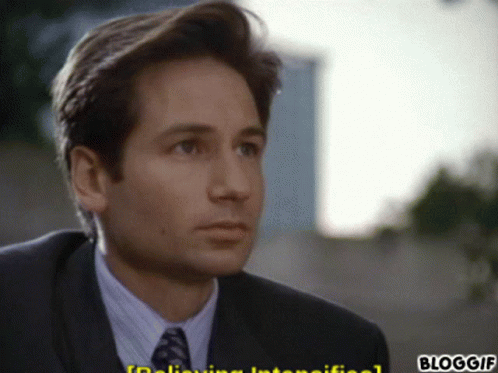Interlude: My dentist thinks aliens built the pyramids

OK, I know I was very clear and said I'd be doing Materiality and the Mandalorian today, and that it'd be all about beskar steel. I have most of the post written, but reality stepped in and set this week royally on fire.
I could've finished what I'd written this afternoon but... well, I blame my dentist for this. I was due to have a dentist appointment, and after two intense days of academic English editing, my brain was already pretty fried. On top of all that, it's a long trip on public transport to get into town and I didn't get any sleep last night.
These are my excuses.
What wiped me out, what really did for me was this. My dentist asked what I'm a "doctor" of, so I explained about having a PhD in geography and having just completed another in ancient magic/ancient history/Egyptology.
And I saw the look on his face. It's the "ALIENS" look. Like Fox Mulder in the second act when Scully can't prove her Sensible Explanation Theory of current events and Mulder gets to put forward his own off-kilter vision of the world.

Oh god.
On a personal note, I get a range of reactions to my PhD topic. Some people say, "Wow, that's so cool!" They usually like Lord of the Rings or Game of Thrones and play Dungeons and Dragons and Skyrim.
Some people misunderstand and think by "magic" I either 1. mean sleight of hand and not magic-magic and say "What, they had card tricks back then?"; or 2. or actually believe in the existence of magic and couldn't be studying something like ritual beliefs and practices, or the anthropology of magic, or anything like that.
Then there's people like my dentist. People who say, "Yeah, but I watched that Graham Hancock show..."
Back in the 1990s, I'm pretty sure Graham Hancock was on the BBC peddling his ideas and you can nod along until he says, "Oh yes, and there's this face on Mars that looks like the Sphinx..."
Back in the 1990s, I was fascinated by Egypt and archaeology but I hadn't done a whole PhD in it. And I had no idea that when I made the choice to study this subject, much of my life would be spent navigating this terrain.
Now, I don't want to get into a "Reasons it wasn't aliens" discussion on here because I suspect they don't work. The people who believe it was aliens, or say "I'm just asking questions", are never going to be convinced by what I say. They're sensible not to take argument from authority all that seriously. But I've read a lot and studied a lot and every time I've ended up having these conversations they've been exhausting and pointless.
The other reason is that I haven't seen Hancock's latest adventure, but I have watched Miniminuteman's excellent YouTube series, which I will link and embed below because he does a great deep dive not just on the archaeology, but the mistakes and potentially disingenuous approaches taken to make viewers think there's a debate where there isn't.
If that's not enough, Kyle Hill also did an Office Hours live stream where he takes on a few debaters in chat, so you can go watch a pro do it, if you like.
What I took from the whole conversation, though, was this. Kyle Hill, who's also just devoted an Office Hours podcast to a spicy chat with the even more terrifying "Vaccines cause autism/5G signals give you [insert illness here]" crowd, made this point.
He remarks that one of the strategies employed in these debates is that you're not operating from the same desire to understand the truth of the world, or debating in good faith.
I'd hoped that once I explained that yes, in fact, the Egyptians used skilled craftspeople to build the pyramids (look up Deir el Medina for accounts from workers, their letters to family members) and not slaves, that we'd be done with the discussion. But no.
My interlocutor tried to get me to agree that because we know there are billions of galaxies out there, we don't know if intelligent life exists on one of them. From here, he tried to claim that I couldn't claim that aliens hadn't shown up one day, done some epic geometry and then left again. Aliens could exist, somewhere in an infinite universe, therefore I can't claim that they didn't build the pyramids.
Even as I write this I groan, because I'm disappearing down a rabbit hole in text where I explain what's wrong with that method of debating. It's not winning, it's exhausting your opponent with an argument so vast and nebulous that I can't one hundred percent say "Damn it, NO!" because that would be rude and not good academics.
As Kyle Hill says, you end up putting out endless little fires of nonsense non-arguments and as such, your interlocutor never has to tackle the framing of your argument. Mine was, essentially, that it's racist, belittling, infantilising, and a whole lot of other unpleasant things to claim that humans couldn't have built the pyramids.
But before I once again get into attempting to argue the minutiae, my issue is that this isn't so much about the arguments and the way that big companies like Netflix can fling money at people making those bad arguments, therefore making them look legitimate.
It's that we have such a poor understanding of the ancient world in the first place that people can easily fall for this kind of messaging. In the same way, we have poor science and engineering education, so people don't know when people like Andrew Wakefield show up with nefarious motives (hypothetically allegedly in Minecraft) what a bad argument looks like when it's in front of them.
One of the greatest advantages I've had in my life has been access to high quality education—not at school, the school was shit—but at home. If we have a baseline understanding of history, geography, and science that isn't so basic that we think a study of twelve children constitutes good evidence, or that people in Ancient Egypt couldn't build big things, then we are less likely to fall for this.
As an aside, I've seen a few strange conspiracy theories pop up in the history sphere lately, including the idea of a lost civilisation of giants called Tartaria, taken apart by Mia Mulder some time ago, and the idea that Helen Keller was a fraud, which is just ableist (see Soup Emporium for his examination of that).
In the meantime, I'll be back with some research notes on Mando and his fixation on beskar steel.
